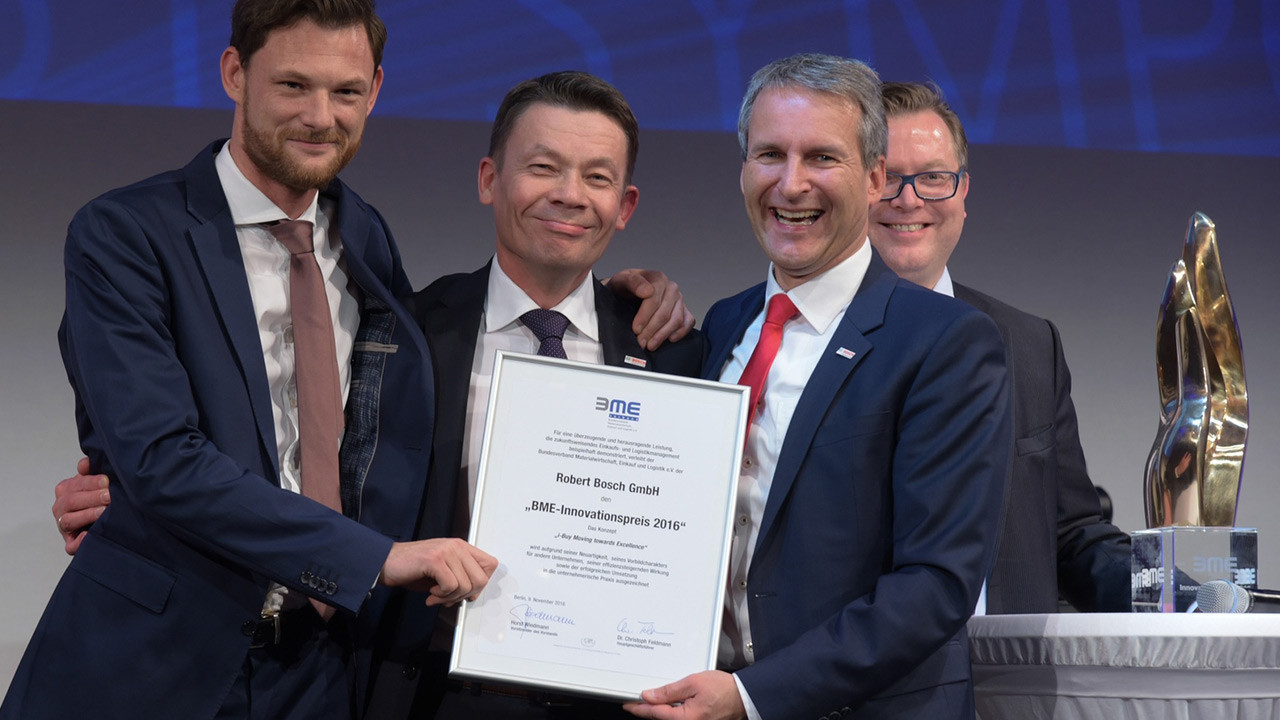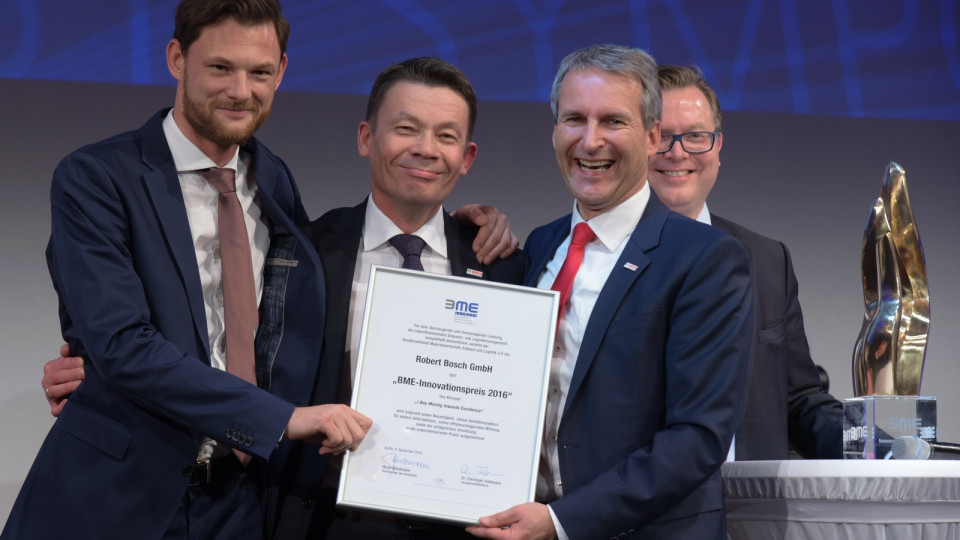Stuttgart, Germany – On November 9, 2016, Bosch received the Association Supply Chain Management, Procurement and Logistics (BME) Innovation Award. Through this accolade, the association acknowledges the outstanding achievements of the supplier of technology and services in the realignment of its indirect purchasing. The operating unit is responsible for purchasing all services, capital goods, and materials that are not used directly in products. As part of a concept implemented globally, Bosch managed to set indirect purchasing up for future success, according to the jury’s statement. Since 2011, Bosch has standardized numerous procurement processes and intensified the centralization of material requirements. “Our evolution into an agile purchasing organization, with a global orientation based on different material categories, is an important factor in our business success. It makes a significant contribution to Bosch’s competitive and innovative capabilities,” says Jörg Mimmel, executive vice president of the corporate sector for purchasing and logistics at Robert Bosch GmbH, who is responsible for indirect purchasing. “Thanks to a much higher degree of automation in our order processes, we are able to act with greater speed and efficiency. We have improved our budgetary efficiency – in other words, the budget we use relative to the savings we made – by more than 30 percent.”
Agile purchasing organization operates with global teams on site
Through the reorganization, Bosch has managed to structure its global material category and supplier strategy in such a way that it has doubled its centralization rate. Order and procurement processes have been pooled, standardized, and accelerated. Mimmel explains: “We have increased our catalog ratio, which reflects the proportion of standardized orders, from less than 20 percent to almost 50 percent.” In order to establish globally unified standards while at the same time maintaining agility and a regional presence, Bosch has organizationally centralized the 230 purchasing departments worldwide. The approximately 1,100 associates in indirect purchasing will be managed centrally from now on. “In the long term, a global matrix organization with regional purchasing units and central management of material categories will ensure an optimal supply system for our Bosch locations worldwide.”
A consistent IT solution is crucial to the success of Purchasing 4.0
One of the cornerstones of Bosch’s future sales growth is web-enabled products and internet-based services. Connectivity encompasses the entire value chain. Mimmel believes that the crucial factor for the success of Purchasing 4.0 is consistent IT solutions. With the help of an intelligent purchase requisition system, for example, users will be able to access the ranges of all categories of goods much more rapidly. In order to establish a completely automated procurement process, Bosch has also involved corporate financial accounting. This allows the whole process – from the purchase requisition to invoice payment – to be electronically modeled. As a result, the company is able to forecast its requirements more accurately and collaborate with suppliers more efficiently.
Indirect purchasing has a global footprint
In 2015, indirect purchasing at Bosch processed purchasing volumes of 7.5 billion euros, and around three million orders for 13 divisions. That includes around 280 manufacturing locations worldwide along with several thousand development and sales locations.
BME Innovation Award
The BME Innovation Award has been presented by the Association Supply Chain Management, Procurement and Logistics (BME) every year since 1986. It acknowledges innovative and sustainable accomplishments and concepts that improve the efficiency of purchasing and logistics on a long-term basis, and in doing so enhance the company’s results.
Mónika Hack
+36 70 510 5516
The Bosch Group is a leading global supplier of technology and services. It employs roughly 375,000 associates worldwide (as of December 31, 2015). The company generated sales of 70.6 billion euros in 2015. Its operations are divided into four business sectors: Mobility Solutions, Industrial Technology, Consumer Goods, and Energy and Building Technology.
The Bosch Group comprises Robert Bosch GmbH and its roughly 440 subsidiaries and regional companies in some 60 countries. Including sales and service partners, Bosch’s global manufacturing and sales network covers some 150 countries. The basis for the company’s future growth is its innovative strength. Bosch employs 55,800 associates in research and development at 118 locations across the globe. The Bosch Group’s strategic objective is to deliver innovations for a connected life. Bosch improves quality of life worldwide with products and services that are innovative and spark enthusiasm. In short, Bosch creates technology that is “Invented for life.”
The company was set up in Stuttgart in 1886 by Robert Bosch (1861-1942) as “Workshop for Precision Mechanics and Electrical Engineering.” The special ownership structure of Robert Bosch GmbH guarantees the entrepreneurial freedom of the Bosch Group, making it possible for the company to plan over the long term and to undertake significant up-front investments in the safeguarding of its future. Ninety-two percent of the share capital of Robert Bosch GmbH is held by Robert Bosch Stiftung GmbH, a charitable foundation. The majority of voting rights are held by Robert Bosch Industrietreuhand KG, an industrial trust. The entrepreneurial ownership functions are carried out by the trust. The remaining shares are held by the Bosch family and by Robert Bosch GmbH.
Additional information is available online at www.bosch.hu



